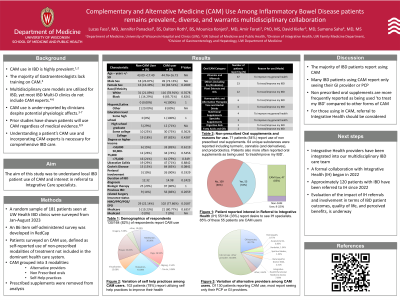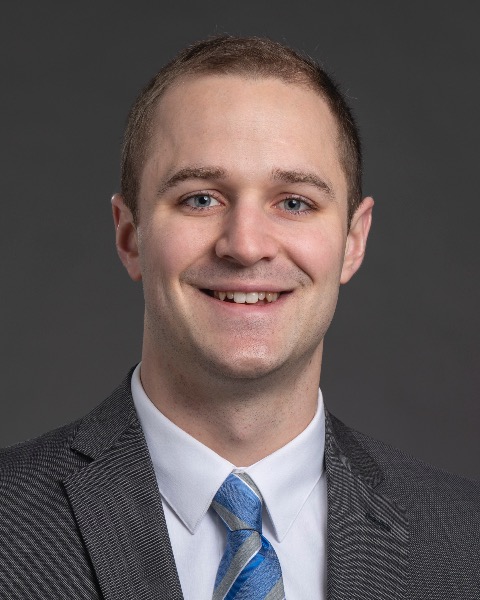Sunday Poster Session
Category: IBD
P0866 - Complementary and Alternative Medicine Use Among Inflammatory Bowel Disease Patients Remains Prevalent, Diverse, and Warrants Multidisciplinary Collaboration
Sunday, October 27, 2024
3:30 PM - 7:00 PM ET
Location: Exhibit Hall E

Has Audio

Lucas Fass, MD
University of Wisconsin School of Medicine and Public Health
Madison, WI
Presenting Author(s)
Award: Presidential Poster Award
Lucas Fass, MD1, Jennifer Panackal, BS1, Dalton Roth, BS1, Mounica Konjeti, MD2, Amir Forati, PhD1, David Kiefer, MD2, Sumona Saha, MD, MS2
1University of Wisconsin School of Medicine and Public Health, Madison, WI; 2University of Wisconsin Hospitals and Clinics, Madison, WI
Introduction: Complementary and alternative medicine (CAM) use among inflammatory bowel disease (IBD) patients is common, yet many providers are unaware of its use. CAM often has physiologic affects and patients utilize CAM regardless of medical evidence. Multidisciplinary care models have been utilized for IBD patients. However, no multidisciplinary IBD clinics report integration of CAM experts. We surveyed IBD patients on their current CAM use and interest in referral to an in-network Integrative Health (IH) clinic for expert recommendations on CAM use.
Methods: A self-guided electronic survey was administered to a random sample of 181 patients in the IBD clinic at a tertiary care IBD practice in the upper Midwest from 1/2023 to 8/2023. CAM use was defined as use of 1 or more non-prescribed modality of treatment which is not a part of the dominant health care system. CAM practices were grouped into 3 modalities: care by alternative providers, use of non-prescribed oral supplements, vitamins, or herbs, and self-help practices. Data was analyzed with a Random Forest Classifier for multivariate data.
Results: 164 (90.6%) IBD patients completed the survey: 99 (60.0%) with Crohn’s Disease and 66 (40.0%) with UC. 130 (79.3%) patients reported CAM use. Compared to non-CAM users, CAM users had higher educational achievement, longer disease duration, and were more likely to be on a biologic or undergone IBD surgery, though not significant (Table 1). CAM users reported a mean use of 1.8 (SD + 0.97) modalities. The most common CAM modality was self-help practices (N=102, 78%), followed by non-prescribed oral agents (N=71, 54%), and alternative providers (N=52, 40%). Common self-help practices included relaxation techniques, prayer, and meditation. Chiropractors were the most common alternative provider. 64 unique non-prescribed oral agents were reported, including probiotics/prebiotics, Cannabis or its derivatives, and turmeric. One third (N=55) of patients were interested in referral to IH for guidance on CAM use.
Discussion: CAM use amongst IBD patients in our clinic is highly prevalent and diverse, consistent with prior studies. Importantly, one third of patients expressed desire for a referral to an in-network IH clinic. Our institution has formed a referral system for interested IBD patients to be seen by IH providers. To date, over 100 IBD patients have seen our in-network IH physicians. Further research is needed to determine the impact of access to IH in the multi-disciplinary care of IBD patients.
Note: The table for this abstract can be viewed in the ePoster Gallery section of the ACG 2024 ePoster Site or in The American Journal of Gastroenterology's abstract supplement issue, both of which will be available starting October 27, 2024.
Disclosures:
Lucas Fass, MD1, Jennifer Panackal, BS1, Dalton Roth, BS1, Mounica Konjeti, MD2, Amir Forati, PhD1, David Kiefer, MD2, Sumona Saha, MD, MS2. P0866 - Complementary and Alternative Medicine Use Among Inflammatory Bowel Disease Patients Remains Prevalent, Diverse, and Warrants Multidisciplinary Collaboration, ACG 2024 Annual Scientific Meeting Abstracts. Philadelphia, PA: American College of Gastroenterology.
Lucas Fass, MD1, Jennifer Panackal, BS1, Dalton Roth, BS1, Mounica Konjeti, MD2, Amir Forati, PhD1, David Kiefer, MD2, Sumona Saha, MD, MS2
1University of Wisconsin School of Medicine and Public Health, Madison, WI; 2University of Wisconsin Hospitals and Clinics, Madison, WI
Introduction: Complementary and alternative medicine (CAM) use among inflammatory bowel disease (IBD) patients is common, yet many providers are unaware of its use. CAM often has physiologic affects and patients utilize CAM regardless of medical evidence. Multidisciplinary care models have been utilized for IBD patients. However, no multidisciplinary IBD clinics report integration of CAM experts. We surveyed IBD patients on their current CAM use and interest in referral to an in-network Integrative Health (IH) clinic for expert recommendations on CAM use.
Methods: A self-guided electronic survey was administered to a random sample of 181 patients in the IBD clinic at a tertiary care IBD practice in the upper Midwest from 1/2023 to 8/2023. CAM use was defined as use of 1 or more non-prescribed modality of treatment which is not a part of the dominant health care system. CAM practices were grouped into 3 modalities: care by alternative providers, use of non-prescribed oral supplements, vitamins, or herbs, and self-help practices. Data was analyzed with a Random Forest Classifier for multivariate data.
Results: 164 (90.6%) IBD patients completed the survey: 99 (60.0%) with Crohn’s Disease and 66 (40.0%) with UC. 130 (79.3%) patients reported CAM use. Compared to non-CAM users, CAM users had higher educational achievement, longer disease duration, and were more likely to be on a biologic or undergone IBD surgery, though not significant (Table 1). CAM users reported a mean use of 1.8 (SD + 0.97) modalities. The most common CAM modality was self-help practices (N=102, 78%), followed by non-prescribed oral agents (N=71, 54%), and alternative providers (N=52, 40%). Common self-help practices included relaxation techniques, prayer, and meditation. Chiropractors were the most common alternative provider. 64 unique non-prescribed oral agents were reported, including probiotics/prebiotics, Cannabis or its derivatives, and turmeric. One third (N=55) of patients were interested in referral to IH for guidance on CAM use.
Discussion: CAM use amongst IBD patients in our clinic is highly prevalent and diverse, consistent with prior studies. Importantly, one third of patients expressed desire for a referral to an in-network IH clinic. Our institution has formed a referral system for interested IBD patients to be seen by IH providers. To date, over 100 IBD patients have seen our in-network IH physicians. Further research is needed to determine the impact of access to IH in the multi-disciplinary care of IBD patients.
Note: The table for this abstract can be viewed in the ePoster Gallery section of the ACG 2024 ePoster Site or in The American Journal of Gastroenterology's abstract supplement issue, both of which will be available starting October 27, 2024.
Disclosures:
Lucas Fass indicated no relevant financial relationships.
Jennifer Panackal indicated no relevant financial relationships.
Dalton Roth indicated no relevant financial relationships.
Mounica Konjeti indicated no relevant financial relationships.
Amir Forati indicated no relevant financial relationships.
David Kiefer indicated no relevant financial relationships.
Sumona Saha indicated no relevant financial relationships.
Lucas Fass, MD1, Jennifer Panackal, BS1, Dalton Roth, BS1, Mounica Konjeti, MD2, Amir Forati, PhD1, David Kiefer, MD2, Sumona Saha, MD, MS2. P0866 - Complementary and Alternative Medicine Use Among Inflammatory Bowel Disease Patients Remains Prevalent, Diverse, and Warrants Multidisciplinary Collaboration, ACG 2024 Annual Scientific Meeting Abstracts. Philadelphia, PA: American College of Gastroenterology.

